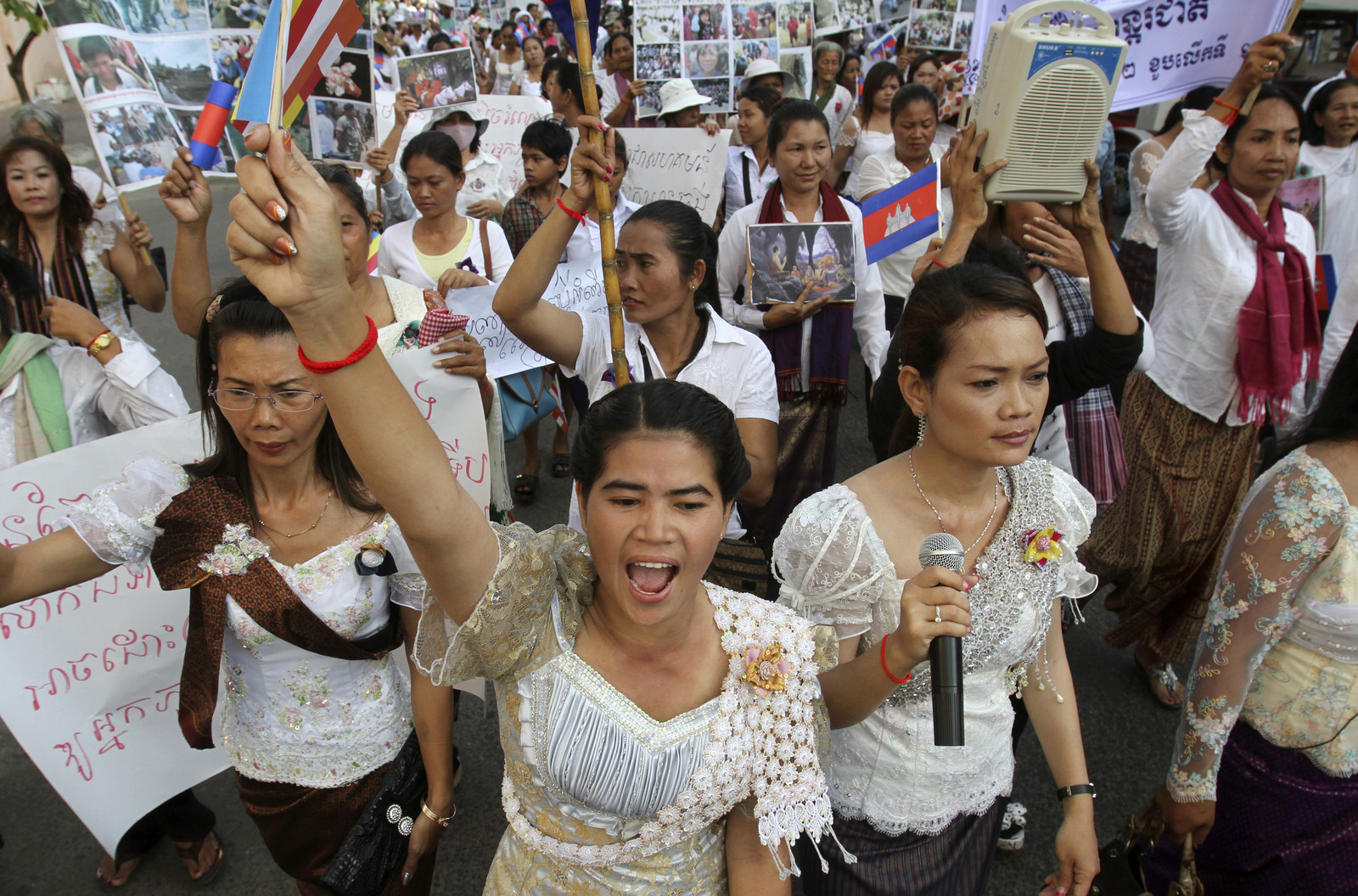
PHNOM PENH — It didn’t come out of nowhere, the machete-swinging that night. Mann Samnos’ husband of 10 years was angry. More than angry. She’d seen so much of his ordinary anger, the yelling and name-calling and other emotional abuse. She’d seen him flame with jealousy if he thought she’d talked to a male neighbor and scream. This night, with the machete, this was something else. Not jealousy, not frustration. “It was more like something possessed him,” Mann remembered, speaking to BuzzFeed News on a dock in Phnom Penh.
He had woken up and attacked the bed where she was lying; he chopped chairs and pillows. He lunged for her face and brought the dull end down on her head. She pleaded for her life and, when her 8- and 12-year-old children woke up crying, she pleaded for theirs. “I will kill you!” he yelled in response. “I will kill you!”
But if he hadn’t chopped off three of Mann’s fingers, chances are that nothing that happened that night would have been treated as a crime.
“Basically you can get hit on the head with a machete, but unless there’s blood, it isn’t a crime,” said Robin Mauney, a gender expert who has been working on the issue of violence against women in Cambodia for 20 years.
Technically, everything Mann suffered that night — and the emotional abuse she suffered for a full year before — violates Cambodia’s 10-year-old domestic violence law. All kinds of abuse, from taunts and threats to emotional manipulation, technically break that law — but only assaults that draw blood, break bones, or leave bruises can be legally punished.
That’s because those kind of “serious” assaults violate Cambodia’s penal code, the law that categorizes and criminalizes physical assaults. The domestic violence law, however, doesn’t lay out any legal punishment for people who violate it, unless they do something that’s criminalized by the penal code applies. So unless the violence men perpetrate against their wives fits the code’s legal strictures of assault, there is no legal mechanism to hold men accountable for the crime.

Last week, Cambodia launched its second National Action Plan on Violence Against Women, intended to coordinate government action on the issue for the next four years. Experts hope a one-stop shop for victim services and its focus on improving legal implementation can mitigate the cruel irony of the domestic violence law: The crime isn’t punished unless the physical injury is seen as overwhelmingly serious, in the eyes of a legal system often as concerned about preserving “family harmony” and keeping couples together as it is about protecting or supporting women.
Good numbers on the prevalence of physical domestic violence in Cambodia are also hard to come by. The most current data comes from a regional report by U.N. Women on violence against women in Southeast Asia. In the 2013 study, 22% of Cambodian women reported having experienced physical violence at the hands of a male partner, but only 16% of men acknowledged perpetrating such violence.
But the other forms of domestic violence outlined in the law — psychological, emotional, or financial — don’t have any legal consequences attached to them, making it all but impossible to track the prevalence of that violence.
In Mann’s case, there wasn’t any immediate help even in a situation that did constitute a crime. As her husband was chasing her with a machete, a neighbor called the police, but they simply never showed up, she said.
In this, Mann’s situation is not unique.
“The local authorities just turn away. It’s happened many times,” said Chhan Sokunthea, who heads the women’s and children’s section of ADHOC, a Cambodian legal assistance organization.
Chhan said even her organization differentiates its work by the severity of assault. “A kick or a slap, something medium is not as serious. The more serious ones — with blood or a black eye or something like that” are the cases ADHOC takes to court, providing pro bono lawyers for women who want legal justice, Chhan said.
Mann initially thought she was one of those women who would face her husband in a courtroom. When her husband finally was arrested, by a military police unit, he was held in jail for four months while ADHOC worked the case on Mann’s behalf. But in December, Mann decided to drop her complaint. “I feel sympathy with children asking for their father,” Mann said.
A 2014 report found that 75% of Cambodian women felt women should keep silent about abuse in order to keep their families together.
Women are commonly dissuaded from reporting or pursuing domestic violence cases by Cambodian culture, as well. Marriage is a massively important institution, and it’s traditionally a woman’s job to keep “family harmony.” (Cambodia’s domestic violence law lists “strength[ening] harmony within the households” as one of its objectives.) Women are expected to speak softly and to submit to their husbands’ will. A 2009 report from the Ministry of Women’s Affairs found that 45% of local authorities thought it was permissible for men to beat their wives under certain circumstances — and 42% of women in a major domestic violence study published in 2014 thought alcohol excused domestic violence.
For generations, family discord has been viewed as a private matter, and speaking openly about violence in the home would bring shame on the family and earn the wife a reputation as a bad woman. A 2014 report found that 75% of Cambodian women felt women should keep silent about abuse in order to keep their families together (only 55% of men felt the same). Of those women surveyed who acknowledge being abused, 76% never sought help.
“‘Break the silence’ is easy to say,” said Ros Sopheap, the executive director of the independent grassroots organization Gender and Development Cambodia (GADC). “But to break the silence is to break the culture. Breaking the culture, really — it’s a kind of battle.”

Mann didn’t feel strong social pressure to keep quiet — her husband’s family vocally disapproved of their son’s violence — but she did feel economic pressure to make amends. Her husband had a job that paid well, making concrete stairs, and when he went to jail, her whole family lost their primary source of income.
The financial importance of men to their families influences law enforcement officials and judges too, the 2014 study found. “Let’s say that I sentence the perpetrator to jail. What I do is essentially take away the only provider of that family,” one male judge told the research team, explaining his mixed feelings about the law.
“Women do not want to put their husbands into prison, even if they report [the violence]. What they want is [him] to stop beating.”
Ros, of GADC, said this is one of the reasons there’s such abysmal implementation of the domestic violence law. “If you implement the law, then every woman in the community is going to be a widow,” she said. “Women do not want to put their husbands into prison, even if they report [the violence]. What they want is [him] to stop beating.”
But there isn’t much work being done, Ros said, to help men change their behavior. Ros said most domestic violence interventions are organized around keeping the victim safe from her aggressor. “But we don’t have a space to bring the batterer, and I think this is a really big gap,” she said. “We don’t have space for men.”
Given the importance of marriage in Cambodian culture, reconciliation remains the priority of police officers, judges, and even some human rights organizations. Experts described a system in which women who push domestic violence complaints forward (usually as divorce cases) are required to mediate the complaint three times; if they still can’t reconcile, the judge finally proceeds toward divorce.
“He signs an agreement that says how he’ll improve his behavior and not beat her,” said Mauney, the gender expert, “and she signs an agreement that says how she’ll behave so that he doesn’t have a ‘reason’ to beat her.”
So when women like Mann drop their complaints, and their husbands get released from jail, there’s little more than hope to keep the women safe. “This is the first time he attacked me; I just hope he can go back to his old character … If he can be a good person again, I don’t want to risk my married life,” Mann said.
But she’s not willing to risk living with him, either. Today, Mann lives and works on a small fishing boat with her in-laws, who she says have supported her and condemned their son’s violence. Her children stay with her husband, and she visits once a month, but she won’t sleep at their house.
“I’m OK to leave the kids because I know from the first incident he did not harm the kids. I know he loves his kids so much,” Mann said. “I’m not sure about me.”
Chhan, of ADHOC, has seen a different side of things. Last year, her organization received 150 complaints of domestic violence. A little more than half of those proceeded to court, a process that can take years. But she’s also seen dropped cases end in tragedy. “Some of the domestic violence cases become murder cases,” Chhan said. “The wife is more and more patient, but the men are more powerful. They make violence, and it gets more dangerous.”

